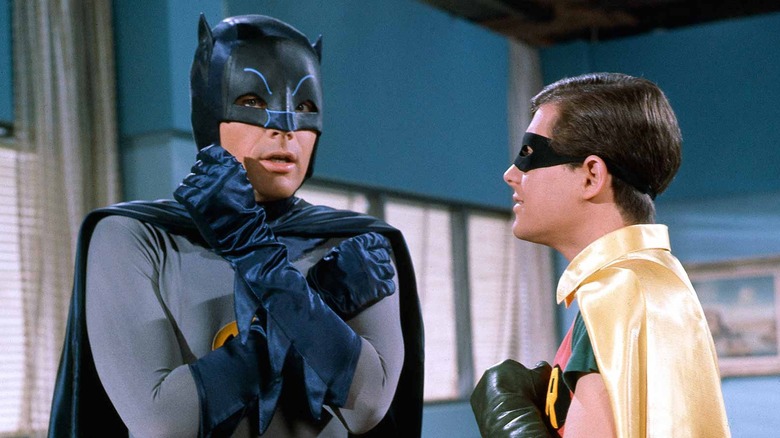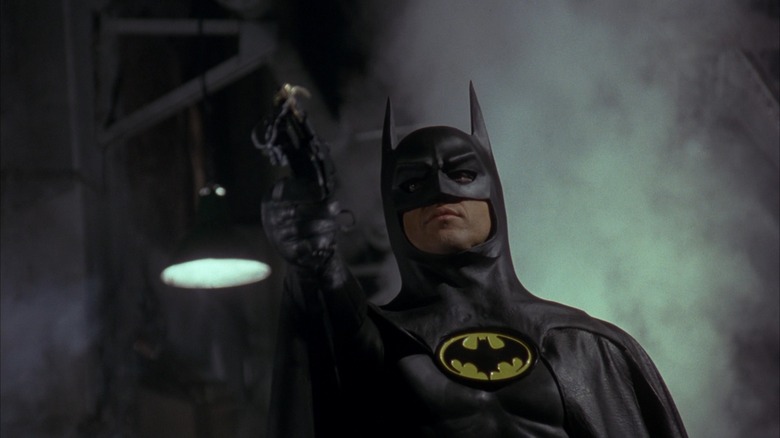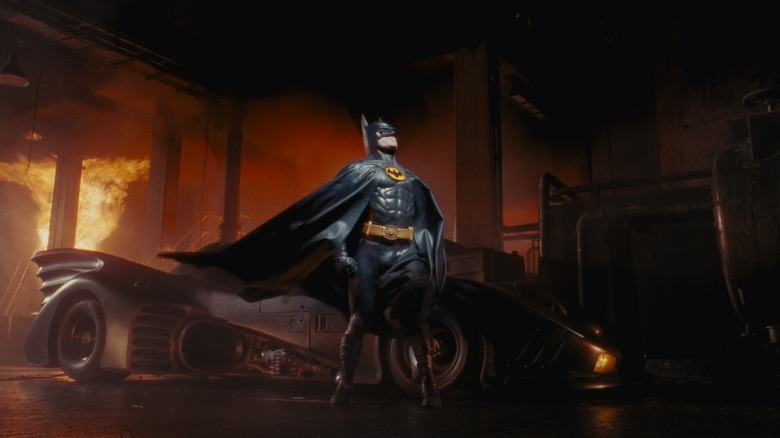Why Adam West Didn't Take Michael Keaton's Batman Casting Very Well
The final episode of "Batman," the sublime TV series starring Adam West and Burt Ward, aired in March of 1968, bringing to a close one of the best TV shows ever made. It would be 21 years until Tim Burton would make the world's biggest smash with his "Batman" feature film in 1989. And while, in 2022, we may be an additional 33 years away from Burton's film (and a full decade from "The Dark Knight Rises." Feeling old yet?), it is the William Dozier-produced TV show that may still carry the character's strongest legacy.
In 1989, when Burton's film was still on the cusp of release, the vast bulk of news coverage devoted to "Batman" compared it to the 1966 TV series (and Leslie Martinson's spin-off film), specifically to highlight how different this new adaptation would be. Gone would be the on-screen "Pow!" sound effects, the colorful costumes, the jokey tone, and the silly supervillains. In their place was Burton's elongated expressionistic set designs inspired by "The Cabinet of Dr. Caligari," a more violent crime plot involving mass murdering the public with poison gas, and a title character who was more stoic and tortured than we had even seen on the screen before.
This was all deliberate. Many readers of the Batman comics — and of comic books in general — resented the popularity of the 1966 "Batman" TV series, as it gave the non-comic-reading public the impression that all superhero stories were colorful, campy, and fun. Those who had already discovered more mature, dramatic stories in their Batman comics didn't appreciate that Pow! and Wham! were now the defining features of all conversations about the medium. Indeed, the producer of the 1989 film, Michael E. Uslan — a Batman fan to his bones — wanted to ensure that Batman was more in-keeping with devoted fans' vision of the character, and as far from the hated TV series as possible.
Of course, fans of the 1966 TV series resented the change brought about by Uslan and Burton. That includes, perhaps naturally, Adam West, who didn't like Michael Keaton at all.
No One Liked Michael Keaton at First
In an interview from 1989, West expressed an extreme amount of dismay about the casting of Michael Keaton. He says that he cried for an hour. West was saddened that he wasn't asked to contribute to the film in any way. But the actor was also begrudgingly at peace with the new direction that Burton and co. were taking the character. "That's their stuff," he said, "That's their business, and they have a film in mind. I've already done it. I've done my Batman." Then, with a sly whiff on confrontation, West asked "Do you want the Classic Coke, or do you want the New Stuff?"
It's important to remember that Keaton was a controversial casting choice in 1989. At the time, Keaton was better known for his comedy work, and starred in a series of comedy hits like "Mr. Mom," "Johnny Dangerously," "Beetlejuice," and "The Dream Team" released only two months prior to "Batman." Keaton began his career in comedy, working in standup to supplement his theater work and his PA jobs on "Mr. Rogers' Neighborhood." His TV work in the late 1970s and early 1980s was also comedy-forward, with Keaton working on "The Mary Tyler Moore Show," among many others.
To Batman fans, Keaton was seen as being incapable of capturing the brooding angst of Bruce Wayne, and he seemingly lacked the physical prowess to fistfight supervillains. Indeed, Burton's design of the character — adding fake musculature to the costume — only seemed to highlight that Keaton wasn't himself a ripped bodybuilder. Burton defended the design by pointing out that Bruce Wayne is trying to pretend to be more powerful and scary than any human, and the fake muscles are a way to highlight his masquerade. If Twitter had been around in 1989, you can bet there would have been an angry hashtag campaign to remove Keaton from the role.
But It All Worked Out
Despite the casting controversy, "Batman" went on to become one of the biggest hits of all time, earning eleventy gazillion dollars domestically (adjusted for inflation). Burton's film also became the inspiration for the Bruce Timm-designed "Batman: The Animated Series," which is still deeply beloved by thirty-somethings to this day. Keaton was not only eventually accepted as Batman, but is now slated to appear as Bruce Wayne in "The Flash" and "Batgirl" movies in the works.
Meanwhile, the 1966 Batman TV series continued its own legacy on the side, eventually reuniting Adam West and Burt Ward to reprise their roles for an animated film called "Batman: Return of the Caped Crusaders," and inspiring any number of toys and comic book series based on the tone and aesthetic of the show.
Because of complicated rights issues, for many years, it seemed that a proper home video release of "Batman" would never see the light of day (Warner Bros. owned the rights to the character, but 20th Century Fox owned the TV show, also ABC might have had some of the broadcast rights ... in short, it was a nightmare of red tape), but in 2014, the show was finally released on DVD and Blu-ray, finally compiling the awesome show for generations to come. The series is also currently available on Tubi.
Meanwhile, Tim Burton's film is on HBO Max. All is right with the world.


